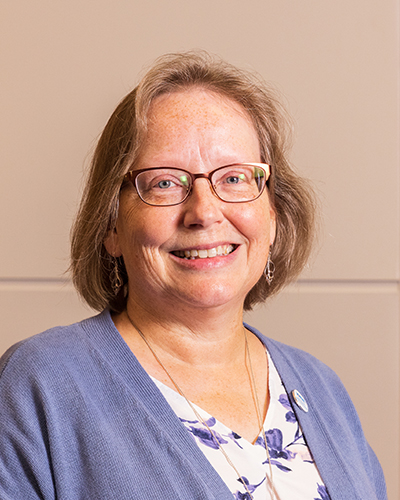Education
BS, Gardner-Webb University
MS, Tulane University
PhD, University of Connecticut
Interests
- Role of regeneration in replacement of body parts
- Preservation of biodiversity through protection of open space
Scholarly Works
Book Chapters
Lail-Trecker M. 2000. Cloning Polymerase Chain Reaction Products Utilizing the T/A Overhang and a Kit. The Nucleic Acid Protocols Handbook. 44: 319-326.
Lail-Trecker M. 1997. Cloning PCR products utilizing the T/A overhang and a kit. Methods in Molecular Biology: PCR Cloning Protocols. 67: 79-87.
Journal Articles
Lail-Trecker MR, Peluso CE, Peluso JJ. 2000. Hepatocyte growth factor disrupts cell contact and stimulates an increase in type 3 inositol triphosphate receptor expression, intracellular calcium levels, and apoptosis of rat ovarian surface epithelial cells. Endocrine 12(3): 303-14.
Heinrich CA, Lail-Trecker MR, Peluso JJ, White BA. 1999. Negative regulation of N-cadherin-mediated cell-cell adhesion by the estrogen receptor signaling pathway in rat pituitary GH3 cells. Endocrine 10(1): 67-76.
Lail-Trecker M, Gulati R, Peluso JJ. 1998. A role for hepatocyte growth factor/scatter factor in regulating normal and neoplastic cells of reproductive tissues. J Soc Gynecol Investig. 5(3): 114-21.
Lail-Trecker MR, Hanrahan CJ, White BA. 1996. Role of cell-cell adhesion in the regulation of prolactin gene expression by extracellular CaCl2. Endocrine 5(3): 341-349.
Delidow BC, Lail-Trecker M, White BA. 1992. Effects of calcium and calcium ionophores on prolactin gene expression in GH3 and 235-1 rat pituitary tumor cells. Molecular Endocrinology 6(8): 1268-76.
Courses Taught
BIO 101 Basic Biology: Organisms
This is an introduction to the biology of organisms and their component parts. Intended primarily for non-majors, the emphasis is on the structure and function of human cells and organs. Two hour lecture, three hour lab. 3 credits.
BIO 107 General Biology I
Prerequisite: One unit of secondary school chemistry or CHEM 102: co-requisite: BIO 117. This foundation course is intended for science majors. The main topics covered include biomolecules, cells, cellular biochemistry, metabolism, genetics and molecular biology. Three hour lecture. 3 credits.
BIO 117 General Biology Laboratory I
Prerequisite: Bio 107, or concurrently. Students apply scientific thinking and basic technical skills to the study of cells. Methods practiced include microscopy and spectroscopy, as well as the collection, graphing, and interpretation of data. Three hour lab. 1 credit.
BIO 118 General Biology Laboratory II
Students perform experiments pertaining to organismal diversity, animal form and function, evolution, animal behavior, and ecology. They also practice experimental design and data analysis, learning and using the applicable terminology. Three hour lab. 1 credit.
BIO 158 Microbes and Society
Intended primarily for non-majors, this course covers some of the basic concepts of microbiology with an emphasis on the role microbiology plays in today’s society. Recognition of different classes of microbes, understanding the places in day-to-day existence where microbes exist, and understanding how microbes have had a significant impact in history are emphasized. Microbes in industry, the environment, the human microbiome, and current, real-world applications of genetic engineering and biotechnology will be discussed. Classes will consist of lecture, group work and activities, and student presentations. An oral presentation and a written paper on a topic of interest are required. Three hour lecture. 3 credits.
BIO 203 Microbiology Laboratory
Prerequisite: BIO 107, BIO 117, CHEM 106. This is an introduction to bacteria and viruses, and the techniques for working with bacteria and viruses, including their isolation, identification, and enumeration. Three hour lecture, three hour laboratory. 4 credits.
HS 320 Regeneration
Prerequisite: BIO 216. The ability of organisms to repair and replace tissues and body parts has long been an intriguing puzzle. This course will focus on regeneration in mammals and will discuss progress in regenerative medicine for selected organ systems. A written analysis and oral presentation on a topic of interest is required. Three hour lecture. 3 credits.
HS 490 Special Topics: Stem Cells Seminar


